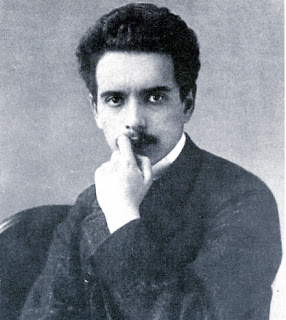Dies ist der Herbst: der – bricht Dir noch das Herz!
Fliege fort! Fliege fort! –
Die Sonne schleicht zum Berg
und steigt und steigt
und ruht bei jedem Schritt.
Was ward die Welt so welk!
Auf müd gespannten Fäden spielt
der Wind sein Lied.
Die Hoffnung floh –
er klagt ihr nach.
Dies ist der Herbst: der – bricht Dir noch das Herz!
Fliege fort! Fliege fort! –
O Frucht des Baums,
du zitterst, fällst?
Welch ein Geheimnis lehrte dich die Nacht,
dass eisger Schauder deine Wange,
die Purpurwange deckt? –
Du schweigst, antwortest nicht?
Wer redet noch? – –
Dies ist der Herbst: der – bricht Dir noch das Herz!
Fliege fort! Fliege fort! –
“Ich bin nicht schön”
– so spricht die Sternenblume –
“doch Menschen lieb ich
und Menschen tröst ich –
sie sollen jetzt noch Blumen sehn,
nach mir sich bücken,
ach! und mich brechen –
in ihren Augen glänzet dann
Erinnrung auf,
Erinnerung an Schöneres als ich: –
ich sehs, ich sehs – und sterbe so!” –
Dies ist der Herbst: der – bricht Dir noch das Herz!
Fliege fort! Fliege fort! –
Dies ist der Herbst: der – bricht Dir noch das Herz!
Fliege fort! Fliege fort! –
– Friedrich Nietzsche
Entnommen der Anthologie Die Ernte aus acht Jahrhunderten deutscher Lyrik, gesammelt von Will Vesper, Langewiesche-Brandt, Ebenhausen bei München 1906. Dieses Gedicht entstammt Nietzsches Buch Gedichte und Sprüche.
Fliege fort! Fliege fort! –
Die Sonne schleicht zum Berg
und steigt und steigt
und ruht bei jedem Schritt.
Was ward die Welt so welk!
Auf müd gespannten Fäden spielt
der Wind sein Lied.
Die Hoffnung floh –
er klagt ihr nach.
Dies ist der Herbst: der – bricht Dir noch das Herz!
Fliege fort! Fliege fort! –
O Frucht des Baums,
du zitterst, fällst?
Welch ein Geheimnis lehrte dich die Nacht,
dass eisger Schauder deine Wange,
die Purpurwange deckt? –
Du schweigst, antwortest nicht?
Wer redet noch? – –
Dies ist der Herbst: der – bricht Dir noch das Herz!
Fliege fort! Fliege fort! –
“Ich bin nicht schön”
– so spricht die Sternenblume –
“doch Menschen lieb ich
und Menschen tröst ich –
sie sollen jetzt noch Blumen sehn,
nach mir sich bücken,
ach! und mich brechen –
in ihren Augen glänzet dann
Erinnrung auf,
Erinnerung an Schöneres als ich: –
ich sehs, ich sehs – und sterbe so!” –
Dies ist der Herbst: der – bricht Dir noch das Herz!
Fliege fort! Fliege fort! –
Dies ist der Herbst: der – bricht Dir noch das Herz!
Fliege fort! Fliege fort! –
– Friedrich Nietzsche
Entnommen der Anthologie Die Ernte aus acht Jahrhunderten deutscher Lyrik, gesammelt von Will Vesper, Langewiesche-Brandt, Ebenhausen bei München 1906. Dieses Gedicht entstammt Nietzsches Buch Gedichte und Sprüche.

